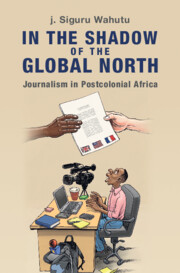Book contents
- In the Shadow of the Global North
- Communication, Society and Politics
- In the Shadow of the Global North
- Copyright page
- Dedication
- Contents
- Preface
- Acknowledgments
- Part I Making Journalists
- Part II Narrating an Atrocity
- 4 African Journalism Fields
- 5 Africans at the Margins
- 6 Framing an African Atrocity
- 7 “That Is Lazy Journalism”
- 8 Lessons Learned
- Appendix Methodological Notes
- References
- Index
- Communication, Society and Politics
7 - “That Is Lazy Journalism”
from Part II - Narrating an Atrocity
Published online by Cambridge University Press: 13 November 2024
- In the Shadow of the Global North
- Communication, Society and Politics
- In the Shadow of the Global North
- Copyright page
- Dedication
- Contents
- Preface
- Acknowledgments
- Part I Making Journalists
- Part II Narrating an Atrocity
- 4 African Journalism Fields
- 5 Africans at the Margins
- 6 Framing an African Atrocity
- 7 “That Is Lazy Journalism”
- 8 Lessons Learned
- Appendix Methodological Notes
- References
- Index
- Communication, Society and Politics
Summary
Focusing on the field’s structure, this chapter shows that African journalists use the ethnic conflict frame to cover African atrocities. This frame is deployed by African journalists even though they and scholars argue that it is stereotypical and oversimplifies complex social processes. This chapter contextualizes its use within Africa while pushing against simplistic readings of its existence. It argues that this frame engages in the politics of who is African while relying on specific collective memories about political manipulation of identity, colonial subjugation, and the war on terror discourse.
- Type
- Chapter
- Information
- In the Shadow of the Global NorthJournalism in Postcolonial Africa, pp. 143 - 160Publisher: Cambridge University PressPrint publication year: 2024

